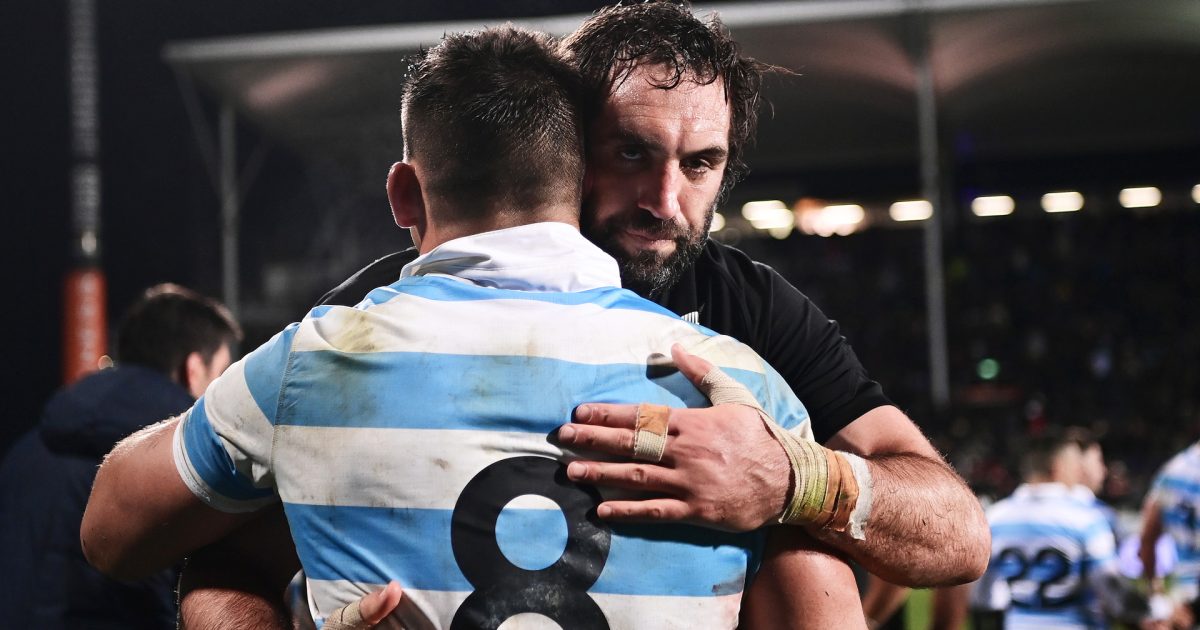Losing the Jaguares may have helped Los Pumas against the All Blacks

The loss of the Jaguares following the abandoned 2020 Super Rugby season was a serious blow for Argentinian rugby and the players, who were forced afar in search of professional contacts.
Most ended up in Europe, some managed to stay in Super Rugby, but either way it forced the abandonment of Argentina’s development vehicle.
This was a devastating paradigm shift for Los Pumas, with players forced on to Northern Hemisphere schedules, they were then forced to play international rugby in the off-season.
Suffice to say it wasn’t a desired outcome for Argentina and the 2021 season appeared to be rock bottom as they were consigned to a disheartening Rugby Championship campaign as the toll grew too large.
But three years down the track this radical development has possibly aided Argentina in their quest to become respected rivals of the All Blacks, who they have managed two victories over since.
The reason all comes back to Super Rugby and the Jaguares, who over time became a well-oiled machine playing high octane, high scoring, attacking rugby.
The Jaguares were forced to match it physically with the South Africans having been placed in their conference, but they also had to have enough skill and points in them to beat New Zealand sides if they were ever to win a Super Rugby title.
The style they adopted by nature was fast, ferocious and hectic. They had talented ball runners out wide, players like Bautista Delguy and Ramiro Moyano, while having the flair and bravado to create for them. Nicolas Sanchez was in charge at flyhalf for a long time, a running No 10 with a penchant for a long ball.
Each year they improved, and eventually reached the Super Rugby final in 2019 after becoming ‘South Africa’s’ best team. They were a force to be reckoned with and routinely dropped 30 points on sides when their attacking play clicked.
But the way the Jaguares played was important because it was also the way Los Pumas played.
With nearly the same players and coaches, they had the time to build combinations and chemistry. That was fundamentally the main purpose of the Jaguares, to mould their national side.
The players were with each other year round, playing with the Jags before donning the white and blue hoops. That time spent together was invaluable in putting together plans and working on them.
The Super Rugby-fuelled Pumas played with similar flair, constructing brilliant tries with daring attacking play but with tighter margins in Test rugby, it was a work in progress.
They would often put three or so tries on the All Blacks, not an easy feat, but the men in black would outlast them in a high-scoring duel.
What’s more, the Pumas desire to play often became a double edge sword. Errors were costly and fuelled All Blacks counter-attack and click plays.
Argentina might score three but concede six, and the All Blacks would run away with the Test in the final quarter and all of a sudden they would lose by 20.
There were hair-brain moments that just cost Argentina Test matches.
The last time the All Blacks visited Argentina in 2019, the year the Jaguares had proved to be a title contender, the game was decided by just four points.
On the stroke of half-time with the game very tight, Nico Sanchez threw a disastrous cutout pass into the hands of Brodie Retallick for a gift of a try.
That one play proved vital in the final wash up, and there is no doubt that he would not throw the pass in the same situation in 2023.
That is because by virtue of not playing Super Rugby together every week, being scattered over the globe and forced into shorter preparation times, Los Pumas have abandoned attacking play.
At least, most of what they used to do. Partly due to lack of time and undeveloped combinations, Los Pumas have simplified their game. Instead, they focused on building a brutal defence under David Kidwell.
And that they have done. Argentina’s defence has dismantled many top sides, including the All Blacks.
The two wins over New Zealand are essentially carbon copies.
One opportunist try, Nico Sanchez in Sydney 2020 and Juan Martin Gonzalez Samso in 2022, aided by a bucket of penalty goals as the defence tore the All Blacks ball carriers to shreds and made a meal of the ruck.
They didn’t need to score three tries. It was in the trenches and in the nitty gritty parts of the game that Argentina came to play.
Holding the All Blacks below 20 points was critical. And to do that they had to play a ton of territory, control the breakdown and win penalties.
They have toughened up, partly from being in European leagues, and partly from not playing Super Rugby.
Argentina’s players are capable of fantastic attacking rugby, as seen by the Jaguares in the past. But what might be pretty doesn’t necessarily win.
Which is why losing the Jaguares has actually helped the Pumas in some ways, particularly when they face off against the All Blacks.
They have a formula that they now know works, provided they execute.

































I’m sorry, but you are mistaken. The coach of the Jaguares when they made the SR final was Quesada. There was intense lack of chemistry, to be polite, between Quesada and the Pumas coach, Ledesma. Quesada also had troubles with Pichot who “ran” the Argie rugby union. The culture that Quesada created was different to Ledesma. As an example, Lavanini had no discipline issues with Jaguares and was a disaster for the Pumas, red card and lost the game to England. Your premise is faulty.
haha yeah, there are a lot of "john's" in the SH media that love to criticize SR with any absurd take they can think of.